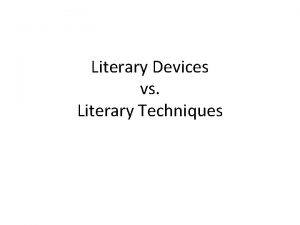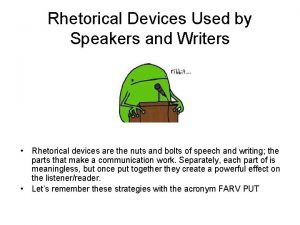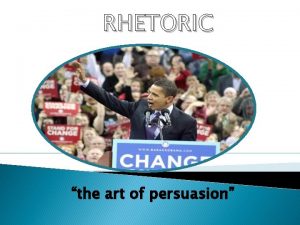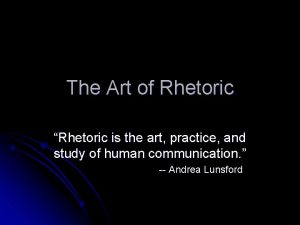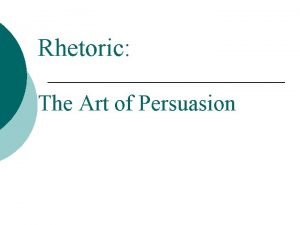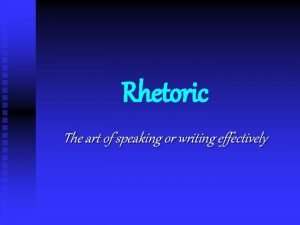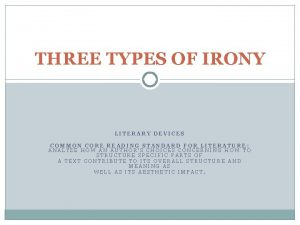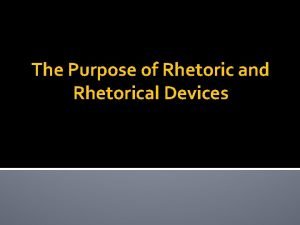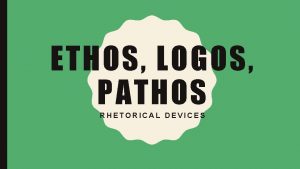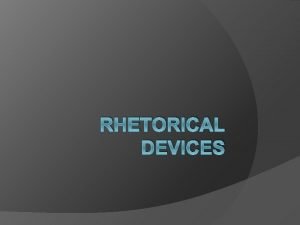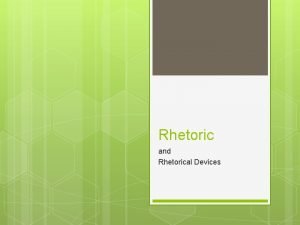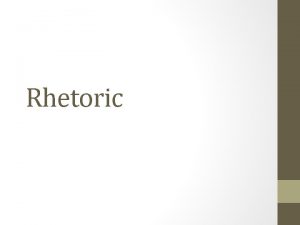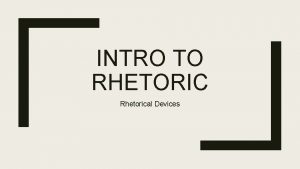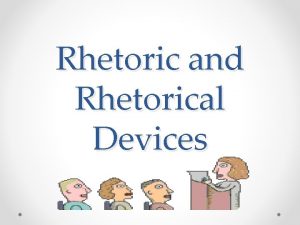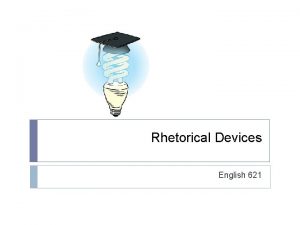Rhetorical Devices What is rhetoric n The art










- Slides: 10

+ Rhetorical Devices

+ What is rhetoric? n The art of persuasion n Using words/ language to persuade

+ ALL LITERATY DEVICES CAN BE USED TO PERSUADE n Irony n Alliteration n Bathos n Foreshadowing n Metaphor n Assonance n Parody n Flashback n Simile n Consonance n Allegory n Flash forward n Personification n Paradox n Connotation n Understatement n Hyperbole n Allusion n Denotation n Imagery n Onomatopoeia n Ethos n Tone n Motif n Oxymoron n Pathos n Diction n Pun n Sarcasm n Logos n Contrast n Repetition n Kenning n Epithet n Shift n Juxtaposition

+ Parallelism/ Parallel Structure n Repeated grammatical pattern. n "When you are right, you cannot be too radical; when you are wrong, you cannot be too conservative. " (Martin Luther King, Jr. ) n "It wasn’t a big cliff. It was only about four feet high. But it was enough to blow out the front tire, knock off the back bumper, break Dad’s glasses, make Aunt Edythe spit out her false teeth, spill a jug of Kool-Aid, bump Missy’s head, spread the Auto Bingo pieces all over, and make Mark do number two. " (John Hughes, "Vacation '58. " National Lampoon, 1980)

+ Antithesis n A rhetorical term for the juxtaposition of contrasting ideas in balanced phrases or clauses n "It was the best of times, it was the worst of times, it was the age of wisdom, it was the age of foolishness, it was the epoch of belief, it was the epoch of incredulity, it was the season of Light, it was the season of Darkness, it was the spring of hope, it was the winter of despair, we had everything before us, we had nothing before us, we were all going direct to Heaven, we were all going direct the other way. " (Charles Dickens, A Tale of Two Cities)

+ Anaphora n A rhetorical device that consists of repeating a sequence of words at the beginning of neighboring clauses, thereby lending them emphasis In time the savage bull sustains the yoke, In time all haggard hawks will stoop to lure, In time small wedges cleave the hardest oak, In time the flint is pierced with softest shower. — Thomas Kyd, The Spanish Tragedy, I, vi. 3

+ Epistrophe n The repetition of the same word or words at the end of successive phrases, clauses or sentences. n “Where affections bear rule, their reason is subdued, honesty is subdued, good will is subdued, and all things else that withstand evil, for ever are subdued. ” — Thomas Wilson n “. . . this nation, under God, shall have a new birth of freedom — and that government of the people, by the people, for the people, shall not perish from the earth. ” — Abraham Lincoln in the Gettysburg Address

+ Enumeration n Detailing or listing parts, causes, effects, or consequences to make a point more forcibly n I love her eyes, her hair, her nose, her cheeks, her lips [etc. ]. n When the new highway opened, more than just the motels and restaurants prospered. The stores noted a substantial increase in sales, more people began moving to town, a new dairy farm was started, the old Main Street Theater doubled its showings and put up a new building. .

+ Rhetorical Question n a figure of speech in the form of a question that is asked in order to make a point and without the expectation of a reply O mighty Caesar! dost thou lie so low? Are all thy conquests, glories, triumphs, spoils, Shrunk to this little measure? (Shakespeare, Julius Caesar, III. i. 148)

+ Analogy n Analogy compares two things, which are alike in several respects, for the purpose of explaining or clarifying some unfamiliar or difficult idea or object by showing how the idea or object is similar to some familiar one. Similar to a simile. n You may abuse a tragedy, though you cannot write one. You may scold a carpenter who has made you a bad table, though you cannot make a table. It is not your trade to make tables. --Samuel Johnson n He that voluntarily continues ignorance is guilty of all the crimes which ignorance produces, as to him that should extinguish the tapers of a lighthouse might justly be imputed the calamities of shipwrecks. --Samuel Johnson n . . . For answers successfully arrived at are solutions to difficulties previously discussed, and one cannot untie a knot if he is ignorant of it. --Aristotle
 4 literary elements
4 literary elements Rhetorical devices in art
Rhetorical devices in art Tricolon literary device
Tricolon literary device Parallelism rhetorical devices
Parallelism rhetorical devices Pathos ethos logos
Pathos ethos logos Rhetoric: the art of persuasive writing and public speaking
Rhetoric: the art of persuasive writing and public speaking Rhetoric is the art of
Rhetoric is the art of Rhetoric the art of persuasion
Rhetoric the art of persuasion The art of speaking or writing effectively is called
The art of speaking or writing effectively is called What is irony literary device
What is irony literary device Asyndeton
Asyndeton
